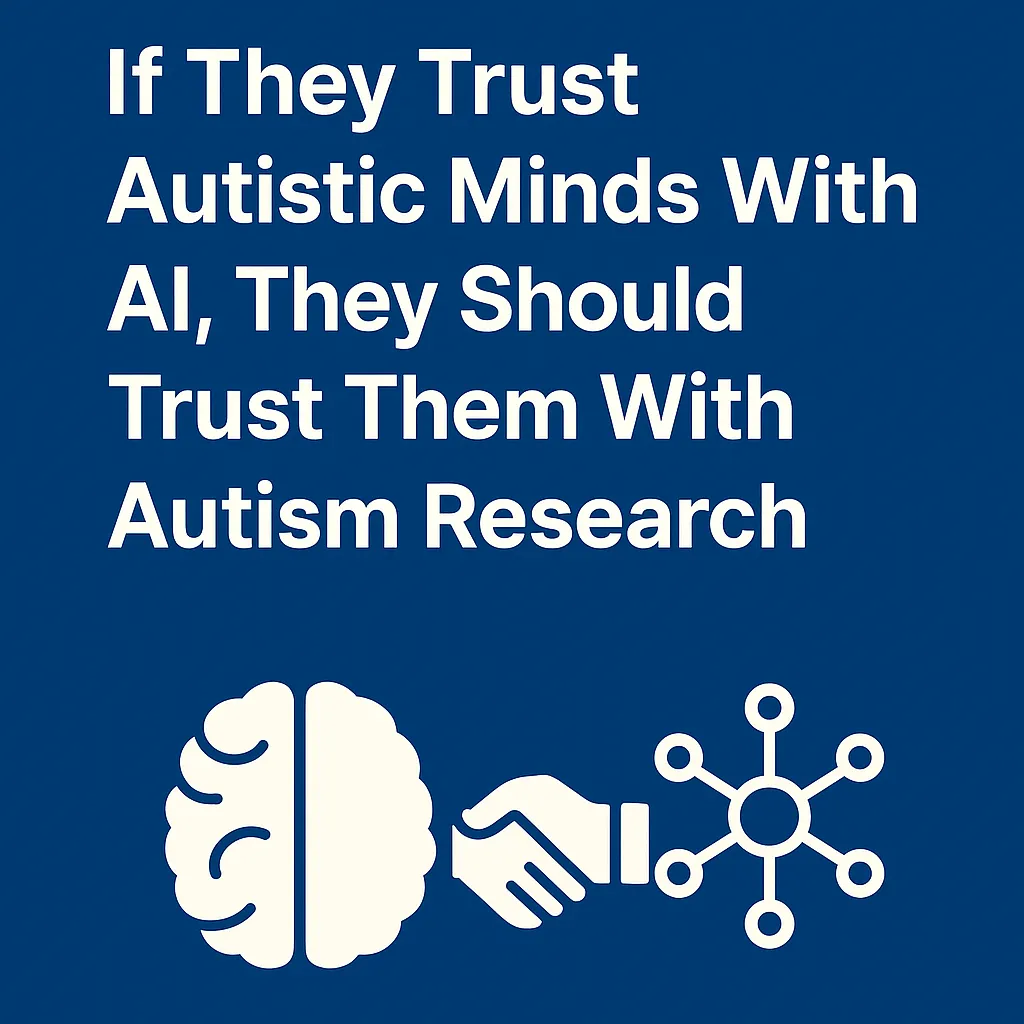Autistic Perspective Isn’t a Disruption — It’s What Autism Research Needs
 The autism research community prides itself on objectivity.
The autism research community prides itself on objectivity.
It values rigorous data, replicable results and harm reduction.
Increasingly, those same values are being applied in another high-stakes arena: the ethical governance of artificial intelligence.
That may sound far removed from the daily life of a parent trying to navigate meltdowns, school meetings, therapies and uncertain futures.
But here’s the link: autism research doesn’t just shape policy — it shapes what parents are told to expect, to fix, to fear.
What gets funded, what gets measured, what gets called “success” — all of that filters down into IEPs, checklists and recommendations handed to tired moms just trying to do right by their kids.
That’s what makes the recent World Economic Forum article worth paying attention to:
How neurodivergent minds can humanize AI governance
It wasn’t a peer-reviewed clinical study. It didn’t claim to be.
It was a signal — from one of the most institutionally cautious organizations in the world — that autistic insight has ethical and strategic value.
Especially when the stakes are high.
“Autistic minds may challenge false assumptions and uncover uncomfortable truths.”
“They may be uniquely positioned to detect when a model’s outputs violate ethical norms — because they’re often the ones harmed when systems fail.”
This wasn’t sentiment. It was systems reasoning.
And it raises a question autism research has been slow to confront:
If neurodivergent cognition is now recognized as essential to ethical tech governance,
why is it still marginalized in autism research itself?
AI and clinical research aren’t the same, of course.
Autism research deals with families, real children, real support.
But both fields construct models.
Both decide whose behavior is normal, whose reactions need correction and whose preferences are inconvenient.
And both build systems that profoundly affect people who can’t always say no.
Autistic people are being asked to flag blind spots in artificial intelligence.
They’re still fighting to be heard in the science that defines them.
The language of autism research has evolved.
“High-functioning” is fading. “Support needs” is more common.
But the metrics often haven’t changed.
A 2025 clinical trial praised a treatment for reducing “core symptoms” in toddlers. The outcomes?
Less hand-flapping. More eye contact. More time spent in adult-directed play.
No measure of autonomy. No attention to whether the children felt safe, regulated, or understood.
The study didn’t ask how those children felt.
It measured how much they stopped looking autistic.
To be clear, some researchers are moving forward.
Participatory models — co-designed protocols, autistic-led interpretation, ethical reflexivity — are gaining traction.
That’s real progress, and it deserves to be named.
But it’s not the norm.
And many parents have felt the consequences: therapies that push behavior over communication, IEP goals that reward suppression over connection, professionals who measure compliance and call it growth.
“The strengths neurodivergent people bring to the table — precision, honesty, depth and logic — are exactly what AI ethics needs.”
These aren’t quirks.
They’re patterns of thought that help identify harm early, that prioritize clarity over comfort and that often refuse to go along just because everyone else does.
They belong in autism research — not on the sidelines.
This isn’t a call to replace evidence with emotion.
It’s a call to remember that autistic people don’t just live what’s being studied. They understand what’s missing from the way it’s studied.
They see what the data leaves out.
And they know when a treatment looks successful on paper — but leaves someone unseen, exhausted or shut down.
Science doesn’t weaken when it welcomes challenge.
It sharpens.
“Neurodivergent people often act out of an internal moral compass — not to please others, but to do what they believe is right.”
That compass matters in AI.
It matters in education and healthcare.
And it must matter in autism research — not because autistic people are flawless, but because they’re living inside the outcomes.
This isn’t a condemnation of parents, either.
Most parents were handed systems built without autistic guidance — and then expected to make sense of it all.
Autistic insight doesn’t erase parental struggle.
It helps make sense of it.
It helps shift the pressure off parents to “fix” their kids — and instead asks systems to fix the way they define help.
If autistic minds are trusted to guide digital ethics,
they’re more than ready to guide the research that still decides what autism means.